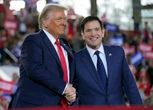Some wealthy Americans are fleeing the United States — with their money, at the very least.
The uncertainty wrought by President Donald Trump’s second term in office has benefitted Swiss banks, as there’s been an uptick in the number of Americans seeking to open banking and investment accounts in recent months, according to reporting by CNBC and The Financial Times. Swiss banks have a long reputation for offering strong financial stability, asset protection and client confidentiality.
While the recent wave of account openings is notable, it’s a familiar phenomenon: Past periods of turmoil in the U.S. have also seen Americans taking their money to Switzerland. The interest now is comparable to the 2007-2008 financial crisis, a wealth management advisor told The Financial Times last month.
“It comes in waves,” Pierre Gabris, CEO of Alpen Partners International, a Swiss financial consulting firm, told CNBC in a piece published Friday. “When [former President Barack Obama] was elected we saw a big wave. Then Covid was another wave. Now tariffs are causing a new wave.”
DIVERSIFYING BEYOND THE DOLLAR
While the specific motivation for moving money may differ, a common theme is currency diversification. The value of the U.S. dollar has weakened relative to other major currencies this year, falling more than 8% this year and reached a three-year low on Friday.
“Many Americans are realizing that 100% of their portfolio is in U.S. dollars so they’re thinking, ’Maybe I should diversify,” Gabris told CNBC.
A lot of inquiries about moving assets to Swiss banks have come from Americans who have more international backgrounds, such as Israeli or Indian roots, Gabris told The Financial Times. “Many are driven by fear.”
BANKING IN SWITZERLAND
While there are fairly straightforward ways for U.S. citizens living in Switzerland to open accounts, according to information from the U.S. Embassy in Switzerland and Lichtenstein, navigating this process from abroad is a bit more complex, albeit legal.
Opening an account in Switzerland probably does require a guiding hand to ensure compliance with U.S. regulations that are aimed at ensuring Americans don’t evade taxes thanks to the secrecy of banking rules elsewhere.
That said, Swiss financial institutions have become more comfortable covering U.S. customers in recent years after dealing with tax issues that had cost Swiss banks billions of dollars in fines, the head of a small U.S.-based wealth management business told The Financial Times.








No comments